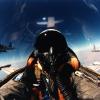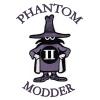About This File
F-107 Version 2.0
Thanks to the following folks:
TK - For the ThirdWire series of sims.
Bunyap - The original modder who created the F-107 MAX file and released it to Dave.
Dave - For providing the original model to me, decals, texture updates, loading screens
Klavs81 - Original textures
dwcace - For providing me with additional reference material
EricJ - F-107C textures
Gerwin - F-16 decals
BPao,MoonJumper,Swede,Wpnssgt - F-16 cockpit, avionics
To my fellow Combatace moderators - For helping me beta test and work out bugs.
Any errors or mistakes are entirely mine.
What you will need first:
For the F-107A:
Strike Fighters 2/Vietnam/Europe - One of these are needed to provide the wing fuel tanks, some decals, and an F-105 cockpit.
(Optional) Strike Fighters Project 1/Strike Fighters Gold/Wings Over Vietnam/Wings Over Europe to provide the F-104 cockpit.
The F-107A will currently not work properly with Strike Fighters 2:Israel or Wings Over Israel (13 Jan 10) due to lack of a compatible cockpit, some decals, visual effects, sounds, ejection seat and fuel tanks from the F-100D.
For the F-107C:
Strike Fighters 2/Vietnam/Europe/Israel patched to Dec 2009.
Aircraft Information (F-107A):
From Wikipedia: http://en.wikipedia.org/wiki/North_American_F-107
The North American F-107, nicknamed "Ultra Sabre", was North American Aviation's entry for a United States Air Force tactical fighter-bomber design competition of the 1950s. The F-107 incorporated many innovations and radical design features, and was based on the F-100 Super Sabre. The competition was eventually won by the F-105 Thunderchief, and the F-107 prototypes ended their lives as test aircraft.
The F-107A was originally designed as a tactical fighter-bomber version of the F-100, and was entered into a competition sponsored by the Air Force. Originally designated F-100B, the aircraft featured a recessed weapons bay under the fuselage, as well as an all-moving vertical fin and a control system which permitted the plane to roll at supersonic speeds.
The aircraft's most distinguishing feature is its Variable Area Inlet Duct, mounted in an unconventional position directly above and just behind the cockpit, which automatically controlled the amount of air fed to the jet engine. The air intake was moved from the chin position (an arrangement later adopted for the F-16) to the unusual dorsal location as the USAF had required the carriage of an underbelly semi-conformal nuclear weapon. The original chin intake caused a shockwave that interferred in launching this weapon. The implications this had for the survivability of the pilot during ejection were troubling. It also severely limited view to the rear, although this was not considered terribly important for a bomber aircraft, it is notable during an era when it was assumed air combat would be via guided missile exchanges outside visual range.
Extensive design changes resulted in its redesignation from F-100B to F-107A before the first prototype flew.
The F-107 was never given an official name, but was sometimes informally called the "Ultra Sabre," referring to North American's earlier fighter designs, the F-86 Sabre and the F-100 Super Sabre. The flight crews referred to it as the "Man Eater," in reference to the position of the air intake directly above the cockpit.
The designation "F-107A" was the only one assigned to the aircraft, though "YF-107A" is often used in publications.
(F-107C):
The F-107A had been chosen for development vs the F-105 and had started to be used extensively in Vietnam in 1967.
Israel does not do the preemptive strike as originally planned in 1967, and therefore what would have been the SiX-Day War instead draws out into a much bloodier conflict.
During that conflict, a nuclear weapon is detonated, touching off a small exchange of nuclear weapons, contained within the middle east area.
As a result, most of the oil fields are contaiminated, and the global economy suffers a depression as a result.
The US government is unable to generate the revenue needed to fully fund the F-14/F-15/F-16 programs. Instead, it invests in technological and engine improvements to existing designs, resulting in the F-107C instead of the LWF program, with the F100 engine, a new canopy and avionics.
Notes and Limitations:
Part of the SWOTUSAF series of aircraft.
Because the real aircraft never proceeded beyond the prototype stage, loadouts, mission capabilities and operational paint schemes are projections only.
3 skins are provided for the F-107A the original prototype scheme, a natural metal scheme, and a Vietnam era scheme. An F-16 style scheme was designed for the F-107C.
Because this aircraft was in competition with the F-105, we projected that it would have taken over the Thud's role in Vietnam, in addition to the air superiority/interceptor role the original F-100 was designed for. So loadouts reflect this.
The aircraft refers to some decals, visual effects, sounds, ejection seat and fuel tanks from the F-100D. The cockpit is based on a single engine fighter with a radar using the J75...either the F-104 or F-105 works fine...it defaults to the F-105 cockpit. You will have to install any other cockpit yourself.
The FM is mainly based on the F-100D, and so shares that FMs limitations. The real test article reached 2.35 Mach...this model has gone up to 2.2 Mach in level flight.
Animations for the canopy and air refueling probe use Animation control keys 1 and 2. Check your Controls page to figure out what keys you need to hit.
This is FREEWARE only, NO money is allowed to be made on the contents of these files, in whole or in part.
Feel free to redistribute, as long as the original authors are given appropriate credit.
Questions? Contact me at Combatace.
FastCargo
13 Jan 10









